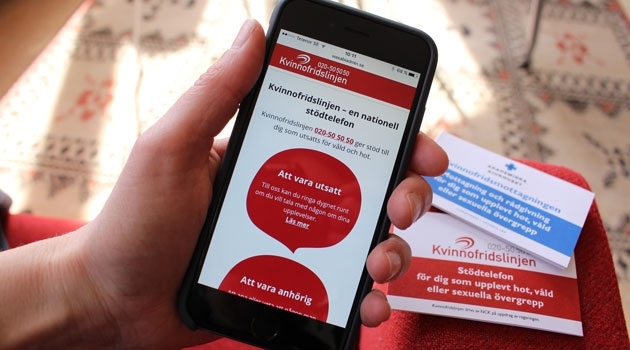Active efforts required to detect violence against women
“Increasing isolation during the COVID-19 pandemic has also increased the risk for violence against women. Active efforts are needed to detect violence and to provide the affected women with support,” says Åsa Witkowski, Head of Clinical Department at the National Centre for Knowledge on Men’s Violence against Women (NCK) at Uppsala University.
Men’s violence against women has been hotly discussed in the media and by politicians, following the murder of five women in Sweden over the course of just a few weeks. Åsa Witkowski is pleased that the issue is being raised and taken seriously.
Is there reason to believe that men’s violence against women has increased during the pandemic?
National Centre for Knowledge on Men’s Violence
against Women (NCK) at Uppsala University.
Photo: NCK
“We have not seen an increase in the number of calls to Sweden’s National Women’s Helpline (Kvinnofridslinjen); however, there are reasons to believe that the need is significant. Increased isolation can make it more difficult to seek help, and there are certainly a number of cases that go undetected.”
In the beginning of the pandemic, NCK delivered a press release with examples of what every individual can do to detect incidences of violence and assist those at risk.
“It is vital to break through the isolation in which these women find themselves and make it clear that you are there to help – be it as a manager, a colleague, a friend or a relative. It is important to repeatedly seek contact and suggest various activities with them, such as going for walks. You need to make it clear that you are available whenever the time comes.”
Gradually approach the subject
If you have a sense that something is not right, it may be necessary to approach the issue of violence gradually. You can start by asking questions, such as: How are you doing? Is there anything you would like to share? Is someone being unkind to you?
Another important action is to share the telephone number of the National Women’s Helpline, a national support line for women subjected to physical, psychological or sexual violence.
“Ideally, the telephone number should be posted in as many places as possible. For example, at Uppsala University, we print it on students’ medical cards. The more widely available the number is, the better,” says Åsa Witkowski.
The importance of not giving up
Another suggestion is to be persistent in contacting a person you believe may be subjected to domestic violence. If you are always the one calling, it can easily become a one-sided relationship; however, you should not give up.
“It is incredibly important that the person facing domestic violence knows that someone outside of the home is interested and cares. They need to know there is someone they can confide in.”
Aside from being persistent, it is also important to have a plan and to know what you can do to help. You may want to contact the National Women’s Helpline yourself and discuss alternatives, such as an emergency room visit, submitting a police report, or going to a women’s crisis centre or a safe house.
“It is important to be psychologically prepared and to have considered the alternatives. If I ask a question, I need to know how to handle the response and which types of suggestions I can make. It is also extremely important to be ready to listen. The importance of listening cannot be underestimated. It may be the first time they have spoken to someone about their domestic situation.”
Training for occupational groups
An important part of NCK’s work includes disseminating information and training various occupational groups, such as teachers, psychologists, nurses, midwives, solicitors and social workers. At the moment, we are conducting training for managers and other staff within Uppsala University.
“It is extremely important that we raise this issue here at the University and spread the message to students, staff and managers, signalling that we take violence seriously.”
Spreading knowledge about the patterns of violence against women and the resources available are key issues in bringing about change.
“Our work contributes to helping professionals that meet individuals in their workplace to have the competence and preparedness to those subjected to domestic violence. We must become better at tackling this serious social problem. The recent tragic events, in particular, highlight this. They are evidence of major societal shortcomings. These women have not been provided with a sufficient safety net.”
Annica Hulth
Active measures against violence
- Break the isolation. Maintain contact with friends and colleagues. Call on your neighbour. Managers have a responsibility for their staff’s working environment, even when they are working from home.
- Ask questions about violence. Everyone that encounters individuals in their profession needs to be able to identify signs of domestic violence and to actively ask questions.
- See to it that the number to the National Women’s Helpline is widely available. The National Women’s Helpline is open 24 hours a day and can be reached on 020-50 50 50.
- Be persistent. Providing the right support – from social services, the Social Security Agency, health centres or the police – can mean the difference between life and death.

